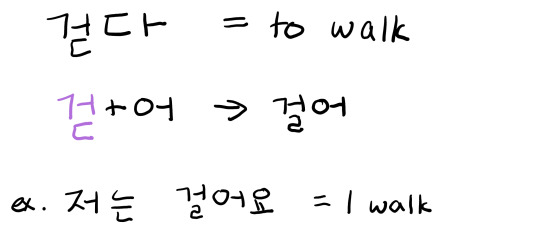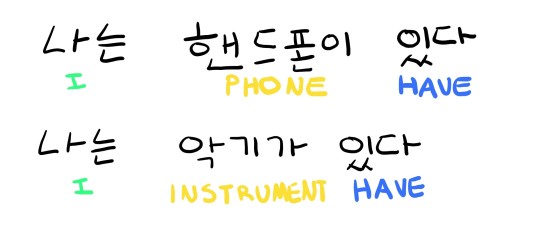Note
Hi! I’m having trouble conjugating verbs from the dictionary 다 form to he present tense (요 form) and I’m not sure if you have any posts that cover that or know of any other websites/ references that would help! Thank you!
Most of the time, you can change the 다 to 고 and add 있어요!
For example,
하다 (to do) → 하고 있어요 (doing it)
가다 (to go) → 가고 있어요 (going)
달리다 (to run) → 달리고 있어요 (running)
The more common way to conjugate the dictionary form to the present tense with honorifics (요 form) is to change it first to present tense then add 요 to turn it into honorifics!
하다 (to do) → 해 (do it) → 해요 (do it [honorifics])
가다 (to go) → 가 (go) → 가요 (go [honorifics])
달리다 (to run) → 달려 (run)→ 달려요 (run [honorifics])
7 notes
·
View notes
Note
요즘 vs 요새? i cant seem to find a decent explaination :( help would be appreciated!
The difference between the two is negligible and are used interchangeably! 요즘 and 요새 are both used to describe a timeframe between now and a recent past. The only real difference is that 요즘 is more commonly used than 요새.
For example, 요즘 공부을 시작했어 and 요새 공부을 시작했어 both mean I recently started studying!
8 notes
·
View notes
Note
How to say fold the laundry and put them in the closet
The word "fold" when used for laundry is different to when it's used on another noun!
For example, the word for fold is usually 접다.
But when folding laundry, it is 개다!
So the sentence would be 빨래 개서 옷장에 놔.
옷장: closet
For more vocab related to laundry, check out this vocab list!
15 notes
·
View notes
Note
What does the ribbon on the portrait mean?
A diagonal ribbon on the upper corners of a portrait signifies that the person depicted has passed. Hope this answered your question!
3 notes
·
View notes
Text
Korean Slang [UPDATED]
I logged into tumblr for the first time in like YEARS and found out that I promised an updated Korean slang post 2 years ago😅
갓생 (gat-saeng) ➡️ "that girl" lifestyle, someone who's productive
고인물 (go-in-mul) ➡️ someone who's played a game for a long time
꾸안꾸 (kku-an-kku)➡️ no-makeup makeup
누물보(nu-mul-bo)➡️ "who asked?"
띵언 (dding-eon)➡️ a good quote
머선129 (meo-sun-il-e-gu) ➡️ what's going on
무물보 (mu-mul-bo)➡️ ask me anything
반모(ban-mo)➡️ banmal mode (not use honorifics)
성덕(sung-deok)➡️ successful fan (a fan whose met their idol)
식집사 (sik-jip-sa)➡️ plant mom/dad
스불재(seu-bul-je)➡️ self-inflicted disaster
알잘딱깔센(al-jal-ttak-kkal-sen)➡️ doing something well/perfectly on your own
어쩔티비 (eo-jjeol-tee-bi)➡️ "what are you gonna do"
억텐 (eok-ten)➡️ (I have a lot to say but I won’t say it)
워라벨(wo-la-bell) ➡️ work life balance
자만추 (ja-man-chu)➡️ (hurts my heart)
케바케 (ke-ba-ke)➡️ case by case
아아 (ah-ah)➡️ ice americano
주불(ju-bul)➡️ tell me your address
킹받네(king-bat-ne)➡️ something/someone is annoying
#korea#korean#learn korean#korean vocab#korean words#korean word of the day#korean vocab list#korean slang#langblr#languageblr
409 notes
·
View notes
Note
Hey! Hope you’re doing well and staying safe :)
I have a quick question! I’ve been hearing this phrase a lot in dramas: “dok bwa ru hae” and I’m pretty sure I butchered the spelling since I’ve been trying to spell it in Hangul and it doesn’t give me accurate translations lol. I think the translation is something along the lines of “do it properly/I’m watching you”?
So I was wondering if you can spell out the proper Hangul for me and lmk the accurate translation? :D thank you so much and have a nice day~~
The proper hangul spelling would be 똑바로 해 and it means what you've translated it to! It means "do it properly" or "do something well". Along similar lines is 정신 차려, which means "get yourself together"
2 notes
·
View notes
Note
do you have any tips on learning how to pronounce koreans words/sentences? thank you ~
I would suggest you listen to fluent or native people speak and try to mimic their pronunciation! So listening to podcasts or watching shows and hearing how a word/sentence should sound like would probably help! If you're an English speaker, English pronunciations tend to be more nasal than Korean (in my opinion) so trying to be more guttural or produce sounds from the throat might help!
2 notes
·
View notes
Note
i want to ask "다녀라". when i search in google translate it means "go'...
but we have 가다 is go too.
could you tell me the difference of this two word? i think they have same meaning..
thank you ad advance
다녀라 is what someone who is older/higher in status would say to someone younger/lower in status, whereas 가다 is just the root word with no honorifics or anything! The root word for 다녀라 is 다니다 and it can also mean attend! 다니다 and 가다 can usually be used interchangeably :)
For example,
나는 학원에 다니다 means "I attend tutoring"
나는 학원에 가다 means "I go to tutoring"
14 notes
·
View notes
Note
Hello~~ I was wondering, is it considered disrespectful if someone were to wear a white ribbon on their hair for fun? Considering white ribbons are also worn in funerals
It would only be considered disrespectful if you wore one to a funeral and you weren't part of the direct family! Otherwise, you're free to wear them in public :)
1 note
·
View note
Note
Can I ask you what a word I have seen on Instagram means ?
Yep! Feel free to ask!
0 notes
Note
How many vocabulary words would we need to read a typical romance fantasy webnovels in kakaopage?
I haven't read webnovels on kakaopage but I'll assume they're similar to never webtoons! Fantasy genres can sometimes use obscure words or words with hanja so they would require more vocab compared to a modern-day romance webnovel! For most webnovels I'd say you'll need to know at least 1000-1500 words to understand the gist of the text! If you want to understand the text almost completely, I'd say around 2000-3000 words should be fine for most cases!
1 note
·
View note
Note
What is the honorific present tense of 좋다 and 쓰다?
It would be 좋아요 and 써요/쓰고있어요!
3 notes
·
View notes
Text
for anyone looking for textbooks!
dropbox containing linguistics textbooks
contains 34 textbooks including etymology, language acquisition, morphology, phonetics/phonology, psycholinguistics, sociolinguistics, & translation studies
dropbox containing language textbooks
contains 86 language textbooks including ASL, Arabic, (Mandarin) Chinese, Croatian, Czech, Danish, Dutch, Estonian, Farsi, French, German, Greek, Hebrew (Modern & Ancient), Hindi, Hungarian, Icelandic, Italian, Japanese, Korean, Latin, Lithuanian, Norwegian, Polish, Portuguese, Punjabi, Romanian, Russian, Serbian, Slovene, Spanish, Swahili, Swedish, Tagalog, Thai, Turkish, Urdu, Vietnamese, Welsh
dropbox containing books about language learning
includes fluent forever by gabriel wyner, how to learn any language by barry farber, polyglot by kató lomb
if there’s a problem with any of the textbooks or if you want to request materials for a specific language feel free to message me!
30K notes
·
View notes
Text
Irregulars Part 2: ㄷ
Enjoy the post!
If the last letter of a stem word ends in ㄷ (for example: 걷다 = to walk), the ㄷ gets changed to ㄹ when adding a vowel. This is only done with verbs.
For example:
*the stem word is in purple!

The reason this conjugation is done is simply because the sounds flows off your tongue better. The ㄷ irregular is simply to avoid saying a hard consonant.
This is done to most stems ending in ㄷ. Common words that this does not apply to (like 걷다 = to tuck) are:
받다 (to get/receive) = 돈을 받았어요 = I received money
묻다 = 묻어요 (to bury) = 제 타임캡슐을 묻었어요 = I buried my time capsule
닫다 = 닫아요 (to close) = 저는 문을 닫았어요 = I closed the door
188 notes
·
View notes
Text
Irregulars Part 1: ㅅ
Irregulars are added to certain verbs or adjectives when adding something to the stem of the word.
Additions that we’ve learnt so far:
~ㄴ/는다 to conjugate verbs into present tense
~아/어 to conjugate verbs into past tense
~아/어요 to conjugate verbs into past tense with casual honorifics
~ㅂ/습니다 to conjugate verbs into past tense with formal honorifics
~ㄴ/은 added to an adjective to describe an upcoming noun
Most of the irregulars are applied when adding a vowel to a stem.
If the last letter of a word stem ends in ㅅ (for example: 짓다 = to build), the ㅅ gets removed when adding a vowel. For example, when conjugating: 짓다 = to make/build
짓 + 어 = 지어
나는 집을 지어 = I build a house짓 + 었어요 = 지었어요
저는 집을 지었어요 = I built a house
Notice that this only happens when adding a vowel. When conjugating to the plain form, for example, you only add “~는다” to a stem and thus ㅅ does not get removed. For example:집을 짓는다 = to build a house
The reason this irregular is done is to avoid changing the sound of a word completely after conjugating it.
Some other examples of words that follow this irregular are:
낫다 = better (adjective)
잇다 = to continue (verb)
Common words that this does not apply to are:
웃다 (to laugh) = 저는 웃었어요 = I laughed
벗다 (to take off clothes) = 저는 옷을 벗었어요 = I took off my clothes
씻다 (to wash) = 저는 손을 씻었어요 = I washed my hands

NOTE
Casual honorifics almost always end in -요
Verbs in formal honorifics always end in -다
254 notes
·
View notes
Text
let’s have a tea party🍵
here’s a tea related vocab list for all of you tea lovers out there (mostly to satisfy my dark academia desires because #coffeeforlife)

차- tea
찻잔- teacup (with handle)
찻잔 받침- saucer
찻주전자- teapot
티백- teabag
찻잎- tea leaf
찻종- tea cup (without handle)
다례- Korean tea ceremony
다식- sweet biscuits eaten with tea (usually made of grains, nuts, honey, etc)
다방- coffee/tea house
녹차- green tea
홍차- black tea
동굴레 차- Solomon’s seal tea (my all time favourite tea its SO good)
옥수수 수염차- corn silk tea
도라지차- Bellflower tea
우롱차- oolong tea
#Korea#korean#learn korean#korean words#korean word of the day#korean vocab#korean vocab list#vocab#vocab list#langblr#languageblr
284 notes
·
View notes
Text
sorry I keep going on hiatus so often :(
Conjugating 있다
있다 can be an adjective, or it can be a verb depending on its usage and context! 있다 is an adjective when it is used to indicate that one “has” something.

Because this 있다 is considered an adjective, we follow the rule for conjugating an adjective to the present tense – which is just leaving it the way it is! So, those three sentences above are perfectly conjugated and grammatically correct.
When 있다 is used to indicate that something/someone is “at/in” a location, it is also an adjective (To Be in a Location Pt.1).

Again, because this usage of 있다 is considered an adjective, we follow the rule for conjugating an adjective to the present tense – just leaving it the way it is. So, those three sentences above are perfectly conjugated in the plain form and grammatically correct.
However, 있다 can sometimes be considered a verb. So it can be conjugated as a verb sometimes. 있는다 is sometimes used rather than 있다. 있다 is considered a verb when a person (or animal) is not only “at” a location, but “staying” at a location or in a state for a period of time.
262 notes
·
View notes